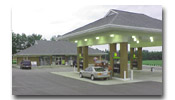 Perhaps the most specialized sector of trucking, the
tank truck industry specializes in bulk transportation services for four
prime customer groups: Petroleum products (including liquefied petroleum
gases); chemicals (including industrial gases); food grade products
(such as sugar solutions, beverages, dry flour, etc.) and intermediate
products (such as paints, solvents, plastic pellets, cement and other
building materials).
Perhaps the most specialized sector of trucking, the
tank truck industry specializes in bulk transportation services for four
prime customer groups: Petroleum products (including liquefied petroleum
gases); chemicals (including industrial gases); food grade products
(such as sugar solutions, beverages, dry flour, etc.) and intermediate
products (such as paints, solvents, plastic pellets, cement and other
building materials).
Every retail gasoline service station is
dependent on tank truck deliveries to serve its customers and thousands
of domestic manufacturers and suppliers rely on safe and efficient tank
truck service to supply their production facilities.
Given the
nature of the industry's customer base, it is reasonable to estimate
that over 70 percent of tank trucks are laden with hazardous materials
(as defined by the U.S. Department of Transportation). Resultantly,
carrier personnel -- from the driver corps through the ranks of
management -- must have singular and specialized knowledge of the
operational and regulatory requirements imposed by the agencies of the
Federal government.
For example, cargo tank vehicles must be
constructed, tested and maintained in compliance with strict engineering
specifications authored by the Department of Transportation's Research
& Special Programs Administration. Drivers, mechanics and safety
specialists must be trained in accordance with "hazmat training"
regulations. The U.S. Environmental Protection Agency demands compliance
with requirements centering on vapor recovery, engine emissions, spill
reporting and clean up as well as the control of pollutants from
internal tank cleaning operations.
No single entity of the
transportation industry bears a greater responsibility for safety and
environmental stewardship, and tank truck carriers meet those
obligations, daily.

